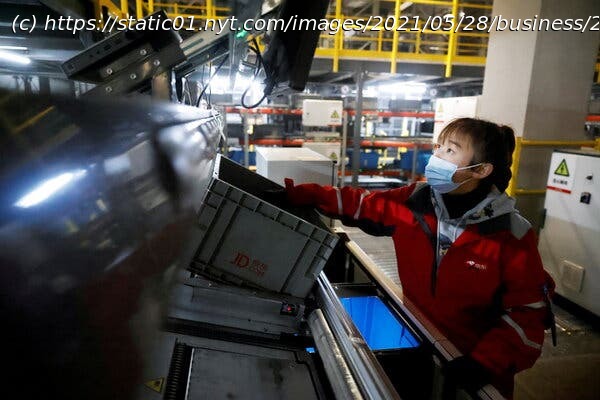JD Logistics , a supply chain unit of JD.com, the big Chinese internet retailer, raised more than $3.1 billion in a share listing in Hong Kong …
JD Logistics, a supply chain unit of JD.com, the big Chinese internet retailer, raised more than $3.1 billion in a share listing in Hong Kong on Friday, the latest Chinese company to raise money in a record-breaking year for the city’s stock exchange. Investors were watching the initial public offering to gauge whether there was still an appetite for splashy debuts by Chinese internet companies at a time when the technology industry is facing intense regulatory scrutiny from Beijing. The scrutiny did not appear to bother traders, who sent the stock up by as much as 18 percent during its first day of trading on the Hong Kong stock exchange. But the stock pared most of those gains during the session, and closed 3.3 percent higher than its listing price, at 41.70 Hong Kong dollars, or $5.37. The offering by JD Logistics, which helps JD.com provide same-day and next-day delivery for tens of thousands of counties and towns in China, valued the company at $4 billion, making it the third-largest share offering in Hong Kong this year. Beijing has imposed record fines on some of China’s biggest internet companies like Alibaba as regulators try to tame the power and anticompetitive nature of the country’s most popular and ubiquitous technology companies. On Friday, Yu Rui, the chief executive of JD Logistics, addressed the regulatory scrutiny and said the company would use the money it had raised to improve its ability to serve smaller cities and pursue overseas markets. Some of the company’s biggest shareholders are Blackstone, the Wall Street private equity firm; Temasek, Singapore’s sovereign wealth fund; and the hedge funds Tiger Global and Oaktree. — Alexandra Stevenson The worst of the pandemic may be over for airlines, but another crisis looms for the industry: an accounting over its contribution to climate change. There’s growing pressure to do something to reduce and eventually eliminate emissions from travel, but that won’t be easy, The New York Times’s Niraj Chokshi and Clifford Krauss report. Some solutions, like hydrogen fuel cells, are promising, but it’s unclear when they will be available, if ever. That leaves companies with few options: They can make tweaks to squeeze out efficiencies, wait for technology to improve or invest today to help make viable options for the future. “It’s a big crisis, it’s a pressing crisis — a lot needs to be done soon,” said Jagoda Egeland, an aviation policy expert at the International Transport Forum, a unit of the Organization for Economic Cooperation and Development. “It’s a hard-to-abate sector. It will always emit some carbon.” Experts say commercial air travel accounts for about 3 to 4 percent of total U.S. greenhouse gas emissions. Planes become more efficient with each new model, but growing demand for flights is outpacing those advancements. The United Nations expects airplane emissions of carbon dioxide, a major greenhouse gas, to triple by 2050. Some researchers say emissions may grow even faster. Investors are pushing businesses to disclose more about their efforts to lobby lawmakers on climate issues, too. There has been some progress: Some large corporations, whose employees crisscross the globe and fill plush business class seats, are reviewing travel budgets to reduce expenses and emissions. A recently announced United Airlines deal will result in the airline’s buying about 3.4 million gallons of sustainable fuel this year. And in France, lawmakers are considering a ban on short flights that can be replaced by train travel. Someday, hydrogen fuel cells and synthetic jet fuel could help to decarbonize the industry, and pilot projects have already begun, mainly in Europe, where Airbus says it plans to build a zero-emission aircraft by 2035. But renewable jet fuel has its limits, too. Despite the challenges, Scott Kirby, the chief executive of United Airlines, is optimistic that investments in alternative fuels and carbon capture technology will yield a breakthrough. “In the near term, it’s about getting them to work economically,” he said. “Once you cross that threshold, you will have an exponential increase.” The Biden administration will require the nation’s pipeline companies to report to the government any time they are hit with a significant cyberattack, and to create 24-hour emergency centers for such episodes, Alejandros N. Mayorkas, the secretary of homeland security, said Thursday morning. The move is the first of several, administration officials said Wednesday night, to address the lessons of the Colonial Pipeline ransomware attack this month, which forced Colonial to shut off the systems that send gasoline and jet fuel to nearly half of the East Coast. But based on the details released by people familiar with the order, it does little to solve the central problems that were revealed by that attack. The new requirement will essentially assure that the pipeline companies always have at least one employee with some cybersecurity training monitoring their systems, though it is unclear what that employee would be empowered to do other than raise an alarm. The order also sets a 30-day period to “identify any gaps and related remediation measures to address cyber-related risks” and report them to the Transportation Security Administration and the Cybersecurity and Infrastructure Security Agency. But the gaps identified in the Colonial ransomware attack most likely would not have been anticipated by any such review, many experts note. And the company’s intense secretiveness in dealing with the government during the episode — including its decision to pay the ransom — was a source of constant frustration to government officials.






